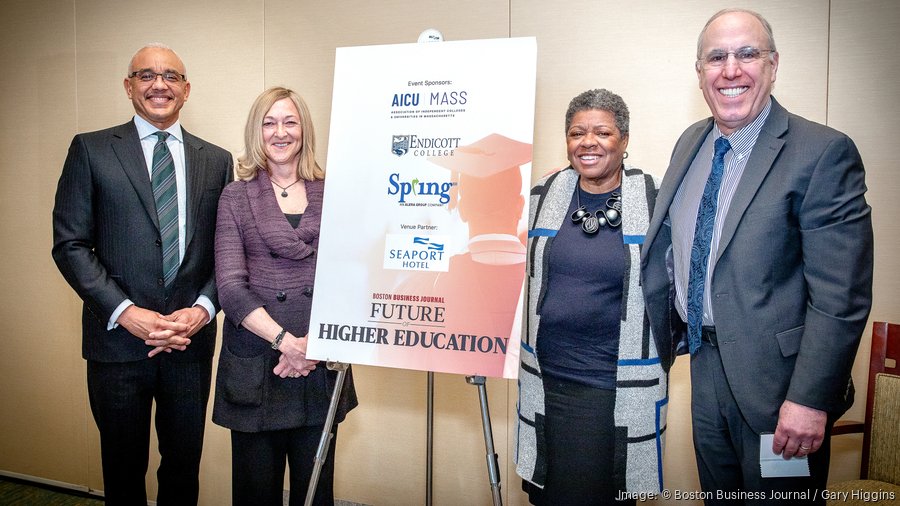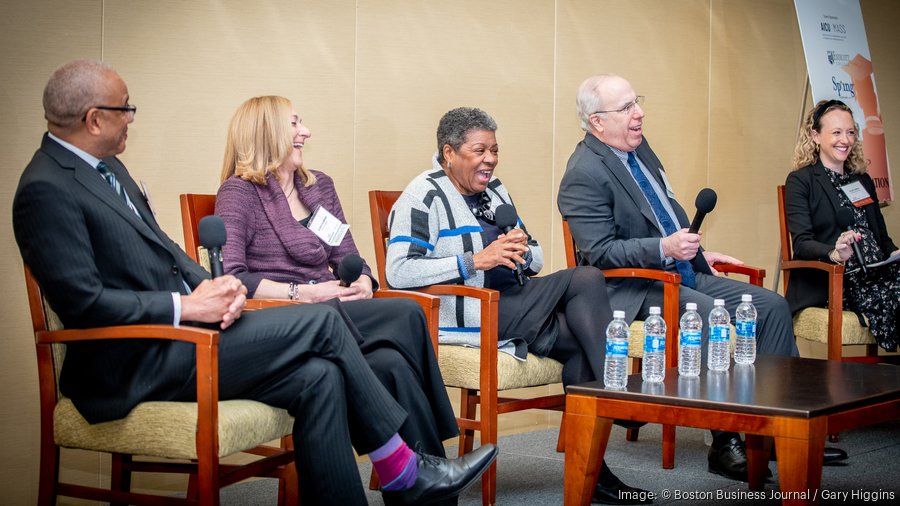One higher-ed leader recently delivered a message to four-year colleges and universities: “You can learn from community colleges.”
Jackie Jenkins-Scott, interim president of Roxbury Community College in Boston, said that four-year schools could benefit from studying how community colleges meet employer needs as pressure mounts on all higher-ed institutions to prepare and launch students into careers, especially as tuition costs continue to rise.
“When we talk about the future of higher education, so much more of it has to be collaborative rather than competitive,” Jenkins-Scott said. “We develop our programs and our curriculums based on real jobs. You all have something that you can learn from community colleges.”
Jenkins-Scott was joined by E. LaBrent Chrite, president of Bentley University; Stephen Spinelli, president of Babson College and Susan Fournier, dean of Boston University’s Questrom School of Business for a March 10 panel discussion hosted by the Boston Business Journal about the future of the higher-education sector.
“One of the beautiful things about community colleges is that they exemplify collaboration, partnerships and preparation,” Jenkins-Scott said. “The role of community college in the higher-education community is critical because we can help our students reduce the cost of their long-term education and prepare them for the workforce.”
The higher-ed leaders weighed in on changing workforce needs and strengthening college-employer relationships to address labor shortages. While the four institutions serve different student populations, all the panelists said that improving and expanding relationships with companies is a top priority, especially as the pandemic and ever-shifting technology impacts workforce needs.
“I tell people that if students don’t get a job, I didn’t do my job,” Spinelli said.
Spinelli said that the higher-education sector needs to do a better job of networking to connect students to businesses and to help students find their passions.
“It's almost too late by the time we get to college,” Spinelli said. “We've got to forge these networks of learning ecosystems that create education as a lifelong reality.”
Bentley University, for its part, is focused on what workforce and employer needs will look like 10 to 15 years down the line, Chrite said. Artificial intelligence, for example, is disrupting the accounting industry — one of Bentley’s signature programs — so the university is working with major accounting firms to imagine “the future of accountancy,” and build insights into the curriculum.
“Those are the kinds of conversations we're having at this extraordinarily disruptive time in the global marketplace,” Chrite said. “It's fun. It's a little scary and it's utterly necessary.”

He said that sometimes faculty are skeptical of working closely with employers, but he sees “no alternative but to invite our most critical external partners in to ensure that we move beyond our comfort zone and begin to incorporate those kinds of efforts across the university,” Chrite said.
“Colleges and universities’ job is to collectively reduce the cost of talent acquisition for hiring partners,” Chrite added. “We have to move beyond the transactional. What's the next evolution of that partnership? It’s not easy and not intuitive but utterly necessary.”
Likewise, BU’s Questrom School of Business depends on advisory councils to evolve its curriculum to anticipate “the future world of work,” Fournier said. She added that bringing industry experts in for information sessions, mentorship opportunities and practice interviews helps prepare students for careers.
Chrite, who joined Bentley last June from Bethune-Cookman University in Daytona Beach, Florida, hopes that students graduate from the Waltham, Massachusetts, university and go on to address the world’s most complex problems rather than just focusing on “shareholder wealth or even their own wealth creation.”
“We're training students to make capitalism better and more accessible,” Chrite said. “We believe that our students have an obligation to serve. Our part is to recognize that those don't lie within the discipline. They lie across disciplines. We have to allow our faculty to engage across the discipline in ways that are difficult and messy if we're to fulfill our obligation to our stakeholders.”
Meanwhile, community colleges are focused on creating talent pipelines of in-demand, entry-level positions, Jenkins-Scott said. Roxbury Community College, for example, recently started a program focused on green buildings to train students to repair and maintain computerized facilities, she said.
“I've been told that in 10 years, all new buildings are going to really be computerized so you have got to have people who can actually come in and fix the air conditioning system when it breaks down,” Jenkins-Scott said. “Where is the workforce going in the future and how do we make sure that we have a pathway for everybody so they can get an entry-level job and thrive (with) a wage that can support their families.”
Jenkins-Scott added that she wants to see more four-year colleges work with community colleges to improve transfer pathways so students can more easily go on to pursue four-year degrees after receiving certificates or an associate’s degree. She said that there needs to be “greater respect for the whole continuum” of higher-ed organizations because “not everyone will go to private institutions.”
“In the old days, (four-year schools would say), we can't take anything from Roxbury Community College,” Jenkins-Scott said. “’They have to take our English 101 because we are the only ones that can teach English 101.’ We have to change that model. Looking towards the future of higher education, students want to leave with less debt and they want to leave with actual skills that lead them to a good paying job quickly. We have to work together to make those things happen.”
Jenkins-Scott, who started as Roxbury’s interim leader earlier this year after the departure of Valerie Roberson, acknowledged that she has a tough job in front of her stabilizing a school that’s endured a stretch of regulatory, enrollment and financial challenges. Still, she said that “institutions in certain communities get a bad rap of having mismanagement problems.”
“Every institution, even our most elite institutions, have not had a completely easy road,” Jenkins-Scott said. “What I've learned in these first few weeks is the universal desire both inside the community and outside of the community for (the college) to do well. There are challenges that every one of our institutions has in our own ways but my colleagues at the table have more resources to address them. I want our students to be able to leave RCC and go to Babson, BU or Bentley. So, we have some work to do in that area.”





